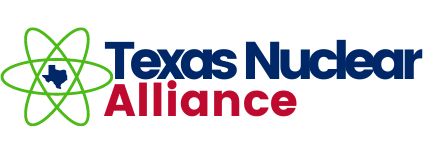89th Texas Legislative Session: Nuclear Victories
Thank you for your tireless work, advice, insights and support during the 89th Texas Legislative Session. Your engagement—through testimony, outreach, and collaboration—was instrumental in advancing the below pro-nuclear legislation and elevating Texas as a national leader in next-generation energy policy. We’re proud of the progress made and grateful for your continued partnership in shaping a stronger, more secure energy future.
House Bill 14
Establishing the Texas Advanced Nuclear Development Office and Texas Advanced Nuclear Development Fund
HB 14—authored by Rep. Cody Harris (R–Palestine), Vice Chair of the House Nuclear Caucus, is on Governor Abbott’s desk for his signature.
NOTE: Governor Abbott issued a press release yesterday congratulating the Texas Legislature for passing HB 14, saying: “Texas is the energy capital of the world, and this legislation will position Texas at the forefront of America’s nuclear renaissance. By creating the Texas Advanced Nuclear Energy Office and investing $350 million—the largest national commitment—we will jumpstart next-generation nuclear development and deployment. This initiative will also strengthen Texas’ nuclear manufacturing capacity, rebuild a domestic fuel cycle supply chain, and train the future nuclear workforce. I look forward to signing it into law.”
HB 14 establishes a framework to accelerate nuclear energy deployment by:
Creating the Texas Advanced Nuclear Energy Office (TANEO) within the Office of the Texas Governor.
- TANEO’s primary functions include promoting the development of advanced nuclear reactors, coordinating with stakeholders, and supporting the nuclear energy industry’s growth in Texas.
- TANEO will submit a Strategic Plan—related to furthering the purposes of the goals of the Office—to the Governor, the Legislature, and Legislative Budget Board by December 1st of each even-numbered year.
- TANEO will appoint a Nuclear Permitting Coordinator to streamline the permitting process for nuclear energy projects in Texas.
- TANEO has a Sunset Provision of September 1, 2035, unless continued by the Legislature.
Establishing the Texas Advanced Nuclear Development Fund to finance advanced reactor projects.
- House Bill 500—the appropriations bill for the 2026–2027 biennium—allocates an initial $350 million for this initiative through the Texas Energy Fund, with the potential to scale up to $2 billion.

Why it matters:
HB 14 stands to make Texas the undisputed leader in nuclear development and continue Texas’ leadership role in ensuring energy security for the U.S., its allies, and the developing world.

One more thing:
TNA applauded the 89th Texas Legislature for passing House Bill 14, with President Reed Clay saying: “With the passage of HB 14 and associated legislation, Texas is now positioned to lead a nuclear renaissance that is rightly seen as imperative for the energy security and national security of the United States. “Such monumental legislation is only possible with the vision and leadership of the Governor, the Lt. Governor, the Speaker, and of course the bill’s authors, Representative Cody Harris and Senator Charles Schwertner. We are grateful for their leadership. It’s time to build.”
Senate Bill 1061
Streamlining the Uranium Mining Permitting Process
SB 1061—authored by Sen. Tan Parker (R–Flower Mound) passed the House unanimously last week. The Senate has since concurred with the House amendments, sending the measure to Governor Abbott’s desk.

What it does:
SB 1061 streamlines the permitting process for uranium mining by allowing quicker approval of permit amendments, within already approved mining areas, without a public hearing if certain conditions are met. It also requires the state to prioritize groundwater conservation during reviews and mandates better notification to landowners, mineral rights holders, and local water districts.

Why it matters:
Uranium is the raw material used to produce nuclear fuel, so making it easier to mine uranium in Texas strengthens the domestic supply chain, reducing reliance on foreign uranium—especially from geopolitically sensitive regions like Russia or Kazakhstan. A more secure, local source improves energy independence and national security. It also helps ensure that fuel availability keeps pace with the development of advanced reactors by reducing permitting delays, positioning Texas to play a leading role in the next generation of nuclear energy.
Senate Bill 1534
Requiring a Nuclear Workforce Study
SB 1534 — authored by Sen. Judith Zaffirini (D–Laredo) and Senator Tan Parker (R–Flower Mound) is headed to Governor Abbott’s desk for his signature.

What it does:
SB 1534 requires a study and report by the Texas Higher Education Coordinating Board to identify gaps in health physics training programs provided by institutions of higher education and to assess workforce needs in the nuclear energy and radiological safety sectors.

Why it matters:
A comprehensive study identifying workforce gaps within the nuclear industry is critical to ensuring Texas has the skilled labor needed to support the growth of nuclear energy.
Senate Bill 1535
Developing a Nuclear Workforce Program
SB 1535 — authored by Sen. Judith Zaffirini (D–Laredo) and Senator Tan Parker (R–Flower Mound) last week passed the House with a 138-4 vote. The Senate has since concurred with the House amendments, sending the measure to Governor Abbott’s desk.

What it does:
SB 1535 establishes a dedicated program within the Texas Workforce Commission to develop a skilled workforce to support the advanced nuclear sector.

Why it matters:
As demand for clean, reliable nuclear power continues to grow in Texas, the state needs a stronger workforce to support the safe construction, operation, and maintenance of advanced reactors and fuel infrastructure.
